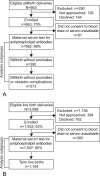Antiphospholipid antibodies in stillbirth
- PMID: 23921873
- PMCID: PMC5684877
- DOI: 10.1097/AOG.0b013e3182a1060e
Antiphospholipid antibodies in stillbirth
Abstract
Objective: To compare antiphospholipid antibodies in deliveries with and without stillbirth using a multicenter, population-based case-control study of stillbirths and live births.
Methods: Maternal sera were assayed for immunoglobulin (Ig)G and IgM anticardiolipin and anti-β2-glycoprotein-I antibodies. Assays were performed in 582 stillbirth deliveries and 1,547 live birth deliveries.
Results: Elevated levels of IgG anticardiolipin and IgG anti-β2-glycoprotein-I antibodies were associated with an approximate threefold increased odds of stillbirth (crude odds ratio [OR] 3.43, 95% confidence interval [CI] 1.79-6.60, 3.8% compared with 1.1% and OR 3.17, 95% CI 1.30-7.72, (1.9% compared with 0.6%, respectively) when all deliveries with stillbirth were compared with all deliveries with live birth. When the subset of stillbirths not associated with fetal anomalies or obstetric complications was compared with term live births, elevated IgG anticardiolipin antibodies were associated with stillbirth (5.0% compared with 1.0%; OR 5.30, 95% CI, 2.39-11.76; IgG anti-β2-glycoprotein-I antibodies (1.9% compared with 0.6%) had an OR of 3.00 (95% CI 1.01-8.90) and IgM anticardiolipin antibodies (6.0% compared with 3.0%) had an OR of 2.03 (95% CI 1.09-3.76). Elevated levels of anticardiolipin and anti-β2-glycoprotein-I antibodies were associated with a threefold to fivefold increased odds of stillbirth.
Conclusions: Our data support consideration of testing for antiphospholipid antibodies in cases of otherwise unexplained stillbirth.
Level of evidence: II.
Conflict of interest statement
Figures

Comment in
-
Antiphospholipid antibodies in stillbirth.Obstet Gynecol. 2014 Jan;123(1):184. doi: 10.1097/AOG.0000000000000071. Obstet Gynecol. 2014. PMID: 24463684 No abstract available.
-
In reply.Obstet Gynecol. 2014 Jan;123(1):184-185. doi: 10.1097/AOG.0000000000000070. Obstet Gynecol. 2014. PMID: 24463685 No abstract available.
References
-
- ACOG Practice Bulletin No. 118: Antiphospholipid Syndrome. Obstet Gynecol. 2011;117:192–199. - PubMed
-
- Branch DW, Silver RM, Blackwell JL, Reading JC, Scott JR. Outcome of treated pregnancies in women with antiphospholipid syndrome: an update of the Utah experience. Obstet Gynecol. 1992;80:614–620. - PubMed
-
- Lima F, Khamashta MA, Buchanan NM, et al. A study of sixty pregnancies in patients with the antiphospholipid syndrome. Clin Exp Rheumatol. 1996;14:131–134. - PubMed
-
- Miyakis S, Lockshin MD, Atsumi D, et al. International consensus statement on an update of the classification criteria for definite antiphospholipid syndrome (APS) J Thromb Haemost. 2006;4:295–306. - PubMed
-
- Meroni PL, Tedesco F, Locati M, et al. Antiphospholipid antibody mediated fetal loss: still an open question from a pathogenic point of view. Lupus. 2010;19:453–456. - PubMed
Publication types
MeSH terms
Substances
Grants and funding
LinkOut - more resources
Full Text Sources
Other Literature Sources
Medical
Research Materials

